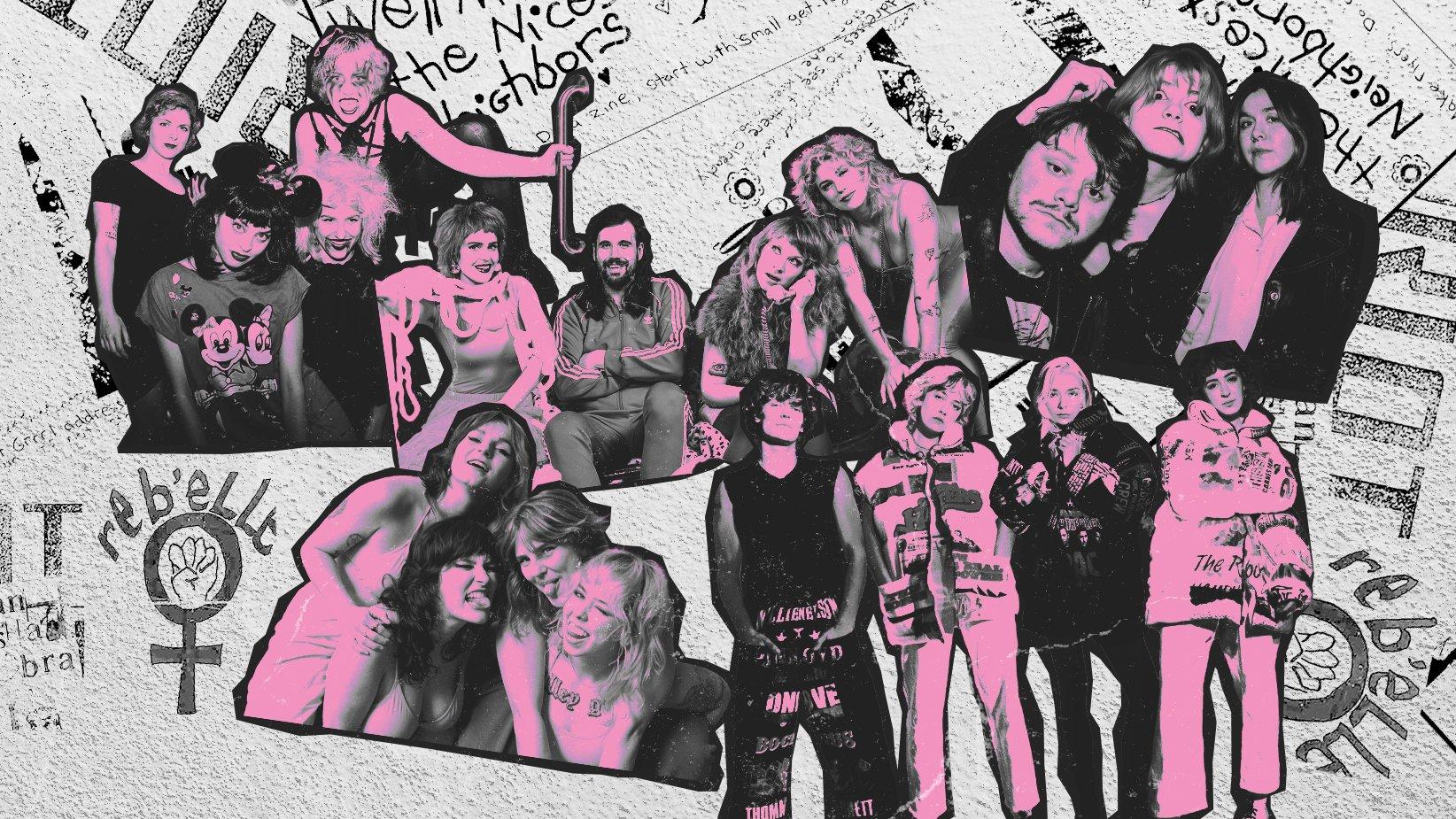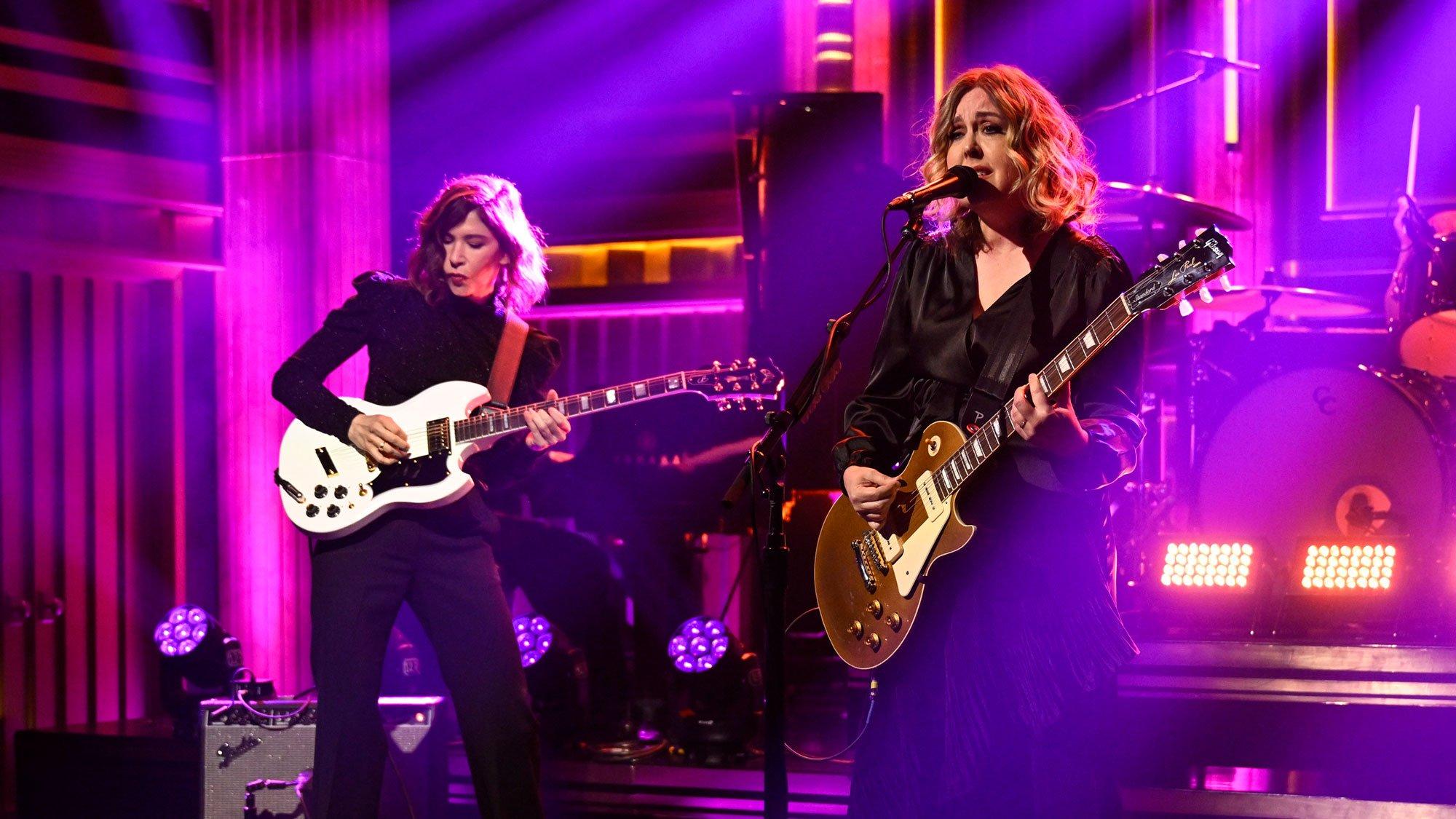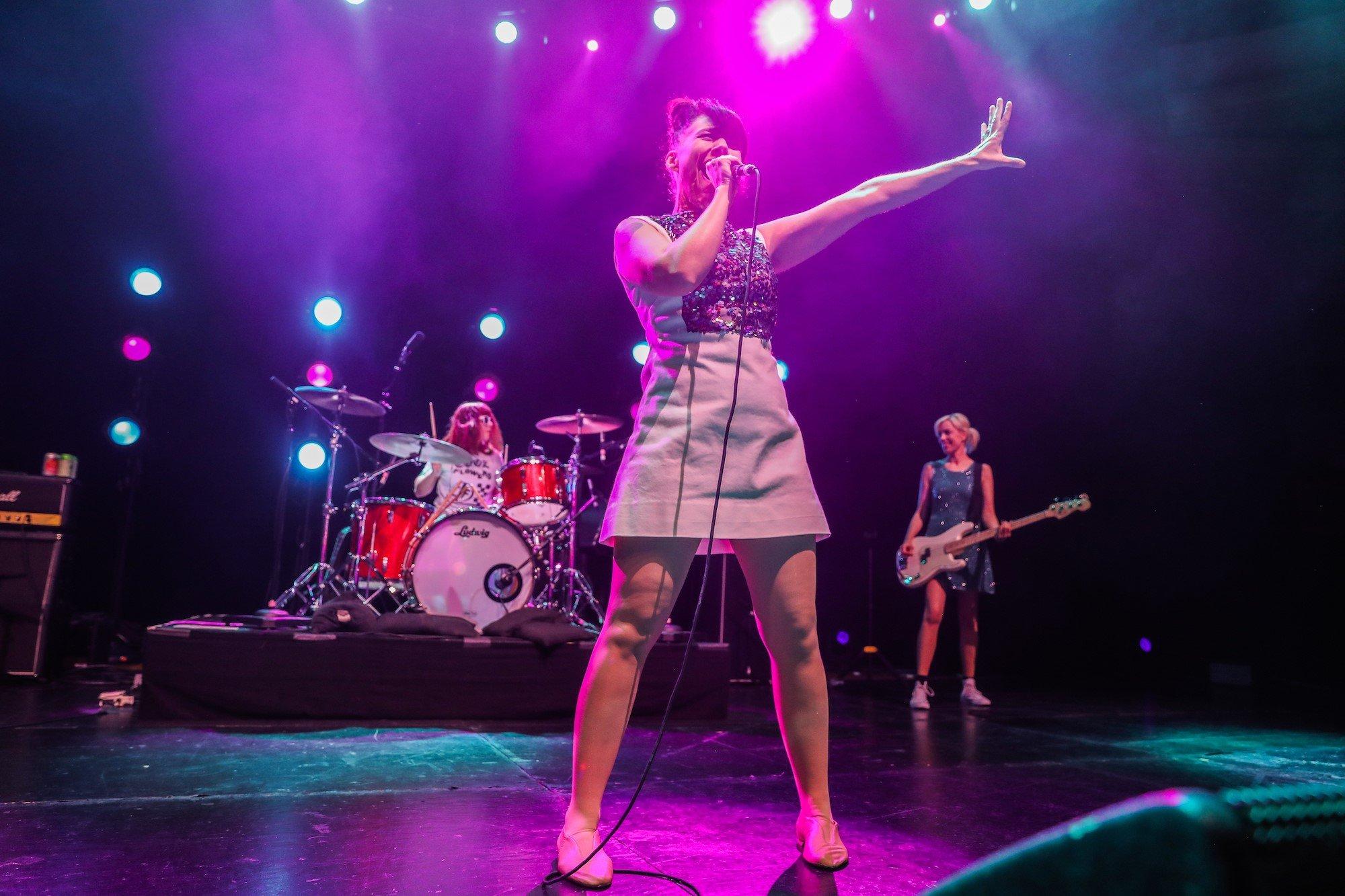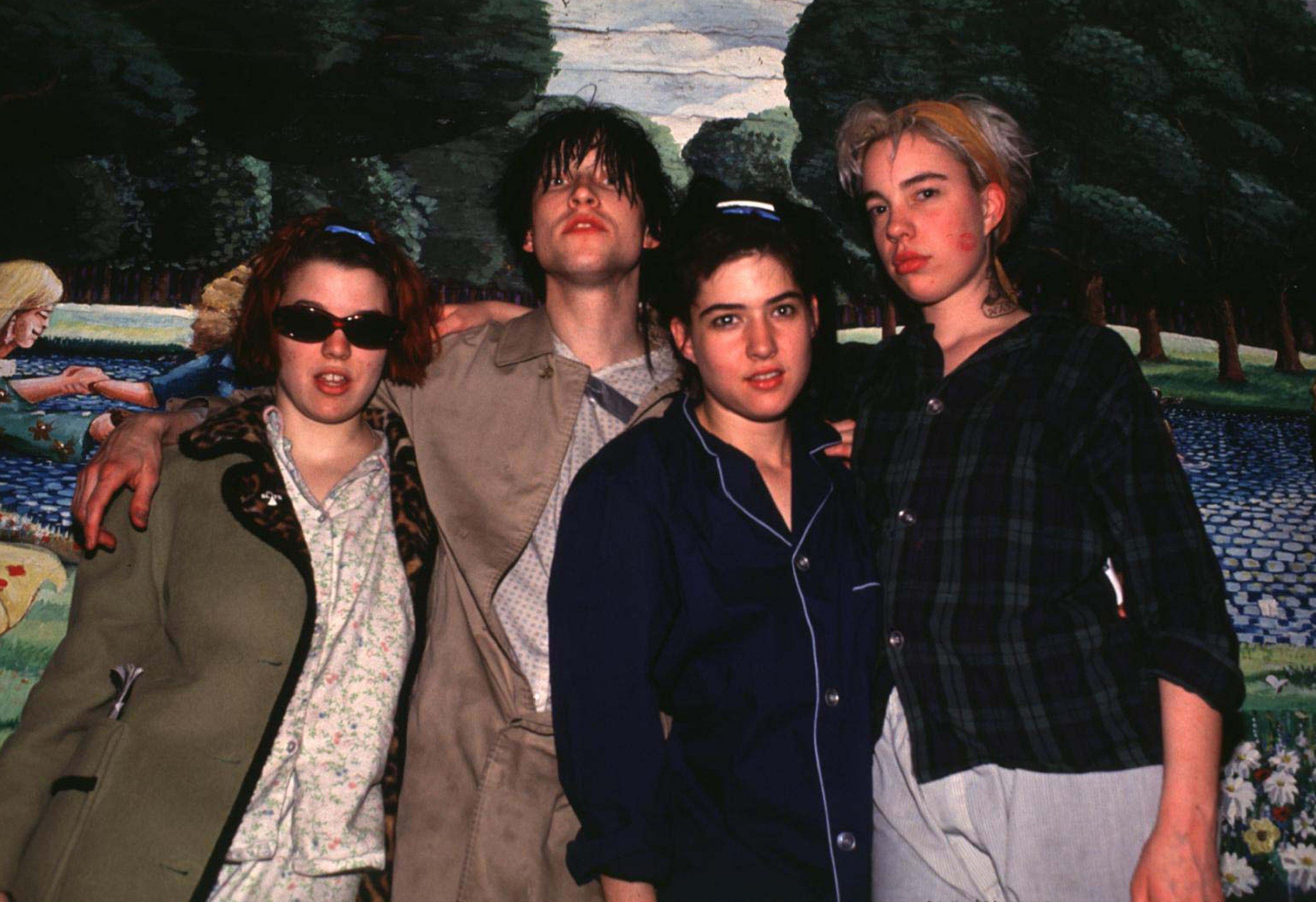Photos: Allyce Andrew; Helen Moga, Travis Trautt; Lissyelle Laricchia; Ren Faulkner

list
8 Bands Keeping The Riot Grrrl Spirit Alive
Since the early '90s, the riot grrrl movement has served as a guide for music that addresses socio-economic issues and the exclusion of women in punk. Decades later, a new wave of female-fronted punk bands embody the attitude and ethos of riot grrrl.
In the early 1990s, a group of women in Olympia, Washington, came together to address the pervasive sexism and male-dominated nature of their local punk scene. These women decided to spark a "girl riot" and gave birth to the riot grrrl movement, providing a platform for female-fronted bands in a male-dominated genre.
Approximately 60 miles north in Seattle — where the grunge scene was dominated by bands like Nirvana and Soundgarden — female-led groups like Bikini Kill and Bratmobile were experiencing the same challenges and were determined to break into a largely unwelcoming scene.
While often categorized as a punk subgenre, riot grrrl is more about implementing messages about social activism within a song than a particular sound. Riot grrrl's do-it-yourself ethos promoted both artistic expression and activism — often seen through independently published and zines socially progressive themes in music. As a result, riot grrrl infiltrated mainstream media and captured the attention of a broad audience.
Although no longer in its heyday, riot grrrl's influence persists. Young, female-led bands continue to use the movement as a blueprint to address injustices, center the talents of women (and non-cis men), and make noise. Read on for eight bands that continue to embody the spirit of riot grrrl today.
Dream Wife
Since their debut in 2016, Dream Wife has made their mark in the punk scene with politically-charged music and a feminism-motivated agenda. Unapologetically embracing the DIY mindset of the riot grrrl movement, Dream Wife cites the New York-based band Le Tigre as one of their biggest influences.
"The sense of community in the riot grrrl movement is something that we take to heart," Rakel Mjöll, lead vocalist from Dream Wife, told Buzz Mag earlier this year. "If you have a platform, you have to share it, however big or small it is."
On their 2023 album Social Lubrication, Dream Wife explores the patriarchal expectations and pressures that weigh upon women. The conflict is laid out clearly in songs such as "Who Do You Wanna Be?": "When the movement becomes part of the patriarchal system we swore to tear down/So what do we do?" The answer, of course, is to forge their own path.
The Regrettes
Los-Angeles based band the Regrettes may not entirely consist of female-identifying members, but they are still renowned for the riot grrrl influence in their music. Lead singer Lydia Night has been touring since she was 12 years old, and made waves for her age and outspoken nature.
With three studio albums and countless tours under their belt, the Regrettes has found its way into mainstream media — and for all the right reasons. The band blurs the lines between indie-pop and punk, producing a genre-fluid sound that is coupled with empowering lines about feminism.
On their popular 2017 track "Seashore," a then 16-year-old Night owned her youth. Proudly, she sang about not allowing herself to get belittled by older people: "You're talkin' to me like a child/But my words are growin' stronger/And my legs keep gettin' longer."
Skating Polly
Skating Polly has perfected the raw DIY aesthetic, from being self-taught musicians to their homemade-looking music videos The band is a family affair, with sisters Kelli and Kurtis Mayo joined by their stepsister Peyton Bighorse.
While the band still addresses political inequality within their songs, those themes don't dictate their entire identity. "I think girls deserve to be able to write songs that aren’t just simply about politics," Kelli told Alternative Press in 2018. "Not everything should be about standing up for your rights. Girls should be able to write songs about whatever the hell they want, the same things that men want to write about."
Panic Shack
From performing at SXSW to opening for Yard Act, the Welsh band Panic Shack has been making noise in the indie music scene. Although their music fits the general definition of a punk band, with raw vocals and loud, stripped-down guitar riffs, they reject the label. Panic Shack unapologetically promotes feminism and aim to inspire younger female-identifying artists and increase the representation of girl bands.
"When we were younger all you saw were men in guitar bands, so it didn’t cross our minds that it could be something we, as girls, could ever do," guitarist Romi Lawrence told Guitar.com. "If us being a band that other girls can look to and be inspired to pick up an instrument by or write a song, then our job is done."
In their song "I Don't Really Like It," Panic Shack convey a powerful message succinctly: "When you look at me like that/I don't really like it/Hey, when you talk to me like that," which are repeated for nearly four minutes straight. The track underscores the importance of promptly acknowledging and respecting someone's feelings when they express their dislikes, without the need for repetition, with the central message overall protesting catcalling and the objectification of women.
Softcult
From crafting a monthly zine to writing and producing their own music, the Canadian duo Softcult epitomizes what the riot grrrl movement stood for.
While citing Bikini Kill as one of their greatest influences, Softcult infuses shoegaze and dream pop into their punk sound. In their latest EP, See You In The Dark, Softcult illuminates several pressing subjects, from sexism to climate change. In standout track "Drain," Softcult channels their frustration toward corporate and political entities who prioritize capitalism over environmental concerns.
The duo recently wrapped a U.S. tour opening for Movements, but their current trajectory suggests that they’ll be headlining venues in no time.
Cheap Perfume
Hailing from Colorado, Cheap Perfume fearlessly confronts and critiques patriarchal systems. Importantly, within their feminist values, the group preaches intersectionality.
Through their track "Fight Like a Girl," Cheap Perfume reclaims the term "girl" as a source of empowerment, challenging the notion that women should remain quiet and submissive. The song dismantles the criticism women face when they speak out against injustice, highlighting how women are often unfairly judged for their actions, and reinforces the need for change.
"To us, feminism is believing in the equity of all people, especially those who are oppressed or viewed as lesser in society," Cheap Perfume’s guitarist told Westword in 2021. "I really think that feminism is for anybody who wants to fight for the rights of women, and that’s all women. So that's including trans women and all kinds of different folks from different backgrounds."
Tacocat
Founded in 2012, Seattle band Tacocat emerged as a refreshing force within the contemporary riot grrrl movement. What sets them apart is their inclusion of pop elements, which bring a catchy and infectious quality to a genre known for its raw, unapologetic sound.
One of the band's standout moments was when their track "Grains of Salt" was featured prominently in the Netflix film Moxie. The film follows a young protagonist as she kickstarts a feminist zine to empower her female-identifying peers. Tacocat's music, with its roots firmly planted in social consciousness, serves as a perfect complement to the movie's empowering message. Their songs are also thought-provoking, characterized by witty lyrics and a lighthearted sound.
While Tacocat is currently on hiatus, their legacy lives on through their three studio albums. Filled with guitar-driven melodies and lyrics that make listeners ponder, their music is a testament to riot grrrl’s everlasting influence.
Mommy Long Legs
Proudly dubbing themselves as a barf-core and brat-punk band from Seattle, Mommy Long Legs takes jabs at sexism, racism, and gentrification throughout their discography.
On "Ditched You," the quartet casts the spotlight on an individual who claims to be a feminist, yet in reality, is a performative activist. Behind the facade of allyship, the character speaks down to women, exhibiting the traits he once claimed to oppose. Thus, Mommy Long Legs leaves the character behind and "ditches him." The catchy song critiques inauthentic efforts, and pushes for genuine commitment to social change.
Mommy Long Legs also use glitter as their weapon of choice, decorating their faces with it, in efforts to reclaim and redefine the idea of femininity in a society that has also determined their idea of what femininity is.

Photo: Todd Owyoung/NBC via Getty Images
interview
On 'Little Rope,' Sleater-Kinney Still Wear Their Hearts On Their Sleeves
Sleater-Kinney's latest album delves into profound vulnerability, crafted in the wake of personal loss and global upheaval. 'Little Rope' showcases the band's enduring spirit, close friendship, and the approach that's kept them relevant over time.
Using lively, raw instrumentals as a vehicle for emotional catharsis, Sleater-Kinney’s Little Rope takes the lead as one of their most vulnerable projects to date.
The "Dig Me Out" singers approach their 11th studio album with a fresh perspective, influenced by their experiences during the pandemic. Despite the departure of drummer Janet Weiss in 2019, the band maintains their iconic post-riot grrrl take on rock music. Carrie Brownstein and Corin Tucker infuse Little Rope with reflective lyrics and raw energy, mirroring their personal growth and resilience.
While working on the album one day, Brownstein received a call with news that nobody ever wants to hear, nor expects. She had been informed that her mother and stepfather had been involved in a fatal car accident while on vacation in Italy. Faced with grief and a sense of unfamiliarity, the band turned to something that always brought them comfort: making music. Little Rope was born.
Despite such a tragic, major life change and trying to make it through a global pandemic, Sleater-Kinney’s motive remains consistent.
"We hope to find people where they're at," Tucker explains to GRAMMY.com. "And it seems like we have, in each stage of someone’s life."
After hosting a GRAMMY U SoundChecks event with the Pacific Northwest Chapter of GRAMMY U, Sleater-Kinney sat down with GRAMMY.com to talk about their perspective on the ever-changing industry and the legendary bands they pull inspiration from.
This interview has been edited for clarity.
It has been almost 30 years since you all released your first album. In what ways has Sleater-Kinney changed since then and what has stayed consistent?
Corin Tucker: We still try to write songs that are emotional and that reach people. Our songwriting has developed over the years and I think we have different methodologies for writing. But, really the most important point of a song is that it makes people feel something. We still try to judge what we do by the same metric as we did 30 years ago.
Carrie Brownstein: One thing we set out to do is to have a unique sound and I think we created a sonic language with each other that we've tried to maintain, but also push the narrative forward and challenge ourselves with each album. That's been consistent from the beginning, we never — even in the early years — wanted one album to sound like the last one. Things change and the industry changes. We just try to stay true to ourselves, but also adapt.
Are there any of your early projects that you feel still resonate to this day?
Corin Tucker: The funny thing about streaming is that people are finding some of those older songs and really getting into them. We found out at the end of last year that people were really into one or two songs off of our very first self-titled record. A really nice thing about having your music available digitally is that it's available to everyone all over the world.
Path of Wellness (2021) was self-produced, as it was made during the peak of the COVID-19 pandemic and Little Rope (2024) was produced by GRAMMY-winning producer John Congleton. What was it like going from a self-produced project to having John on the next project? Was there a certain reason you chose to work with John?
Carrie Brownstein: Self-producing for us was very anomalous. We've always worked with producers and one of the reasons is to just have an outside perspective — somebody to come in and be the tiebreaker or to just bounce ideas off of. So, it was kind of a no-brainer to return to a producer after the solitary of the pandemic.
We have always been fans of John Congleton's work. We come from similar backgrounds and have been in talks to work with him for a while. Fortunately for this album, it worked out and we felt like these songs would be really well served by his productions.
Could you tell us a little bit about your dynamic as a music duo? When writing songs, do you both try to work on them 50/50 or is it on-and-off, where one of you may take the lead for certain songs? And what was this collaboration like specifically with Little Rope?
Corin Tucker: Our goal is always to make the song as strong as it can be. We’ve worked together long enough to know that that's the most important thing. Sometimes a song is more an idea of one or the other, and you need to wait until they’ve fleshed it out to come in with your parts. We have a bunch of different modalities and we just try to keep the conversation going. It's a lot about communication – it's an ongoing constant conversation between the two of us on where the song is at and what we think it might need.
Can you share any standout memories or experiences from when you were writing Little Rope?
Carrie Brownstein: My friend has an apartment in Downtown Portland and he was out of town. So, he let us use the space as a writing studio. And neither of us live in Downtown Portland, so it was interesting to be in this highrise in Portland looking out over the city — sort of being in conversation with the city and changing the landscape in which we were writing was nice to have.
As Pacific Northwest natives, how do you see your Pacific Northwest roots stick out in your music?
Corin Tucker: A lot of the sounds from the historic bands you can hear in our music. You can hear Nirvana, you can hear the Fastbacks, so you can hear so many of those Pacific Northwest musicians. They were bands that we grew up with and bands that we still try and emulate with what we do.
I feel like a good number of Sleater-Kinney fans have stayed fans and grown with you all over the years. What about your music and your brand do you think resonates with people even in different stages of their lives, and how did you foster this dynamic?
Carrie Brownstein: Sleater-Kinney’s a very earnest band. We wear our hearts on our sleeves and I think our audience appreciates that rawness and vulnerability. It's emotional music.
We have a lot of younger and newer fans. I think they relate to the emotionality and the honesty in the music, so that’s what we try to stick with.
You have said that The Showbox is one of your favorite venues to play at in Seattle. How does it feel being back at The Showbox for two sold-out shows?
Carrie Brownstein: We really enjoy the intimacy of a smaller venue, allowing the fans to get a little closer to the stage and feeling more connected with them. It's just nice to feel a sense of history, a through line with our career and our relationship with the city. We're really excited to be here.
I’m curious to know how your fans reacted to Little Rope. Have you noticed any common reactions to the project? Or any particular responses that have stood out?
Corin Tucker: People really relate to the emotion in the music. We've gotten a lot of people saying that it helped them through a hard time. Having that impact on people is pretty special when they feel like it's okay to be emotional and process things with music.
Lastly, you have the rest of your international tour to go, but what else is coming up for Sleater-Kinney?
Corin Tucker: We're very excited to play shows internationally. There may be some cool stuff coming up that maybe hasn't been announced yet, but we're looking forward to more touring.
Carrie Brownstein: For an album cycle, it's almost two years and so, for the most part it will be, it'll be touring and then we'll write something else.

Photo: A. Jesse Jiryu Davis
news
Grrrl Power
Documenting the impact of the '90s riot grrrl movement
From Bob Dylan's protest songs in the '60s to Rage Against The Machine's leftist rants in the '90s, socially conscious music has often been celebrated for its boldness and progressive vision.
In the early '90s, riot grrrl emerged as a vibrant feminist punk movement in the Pacific Northwest, led by bands such as Bikini Kill, the Butchies, Excuse 17, Heavens To Betsy, and Third Sex, among others. Riot grrrl, which generally attracted high school girls and young women not far removed from their teens, drew criticism from both the mainstream and underground music media. For the young women and girls in the movement, media accusations that they resembled whiny children rather than righteous revolutionaries felt like an extension of the institutionalized sexism that had been used to oppress women for centuries.
"We were young and we were doing something that was really important to us," says Kathleen Hanna, former vocalist for Bikini Kill, arguably the movement's preeminent band. "It was a time when feminism was considered ridiculous. There's still a lot of that around today. We were not only ridiculed in the mainstream press, but we were also hated in the underground magazines."
Approximately 20 years later, riot grrrl is receiving acceptance as a viable social and musical movement with a lasting impact. The Fales Library & Special Collections at New York University has established a riot grrrl collection to document the evolution of the movement. Fanzines, journals, flyers, clippings, photographs, and video footage are some of the materials that have been donated to the collection by riot grrrl artists. The collection will provide primary resources for scholars studying feminism, punk activism, gender theory, and music history.
The fanzines, in particular, were a critical component of the movement. Homemade riot grrrl zines, including provocative titles such as Housewife Turned Assassin, were often personal reflections on feminist issues such as reproductive rights, violence against women, unequal pay in the workplace, and stereotypical female body image expectations.
Girls To The Front, an in-depth book examining the history and importance of riot grrrl, was released this past September. Authored by former riot grrrl participant Sara Marcus, the book attempts to bring clarity to the movement and dispel lingering misperceptions. For example, the book aims to punctuate the point that riot grrrl was not just about music, but a scene that also embraced meetings on important female issues, national conventions, social activism, art, fanzines, and other devices designed to empower females.
"Riot grrrl had become this vague cloud of anything that happened in the early '90s that had to do with women and loud music," says Marcus, who first became involved in the movement as a high school student living in suburban Maryland in the mid-'90s. "But that [inaccurate definition] leaves out the zines and teenagers having meetings. It definitely became a scene of the music world, which did keep the idea that there was this thing called riot grrrl alive. So many movements that don't have a musical component completely vanish."
As an indispensable founding figure in the riot grrrl movement and one of its most political outspoken exponents, Hanna discovered firsthand the power riot grrrl and music had in bringing hope and solace to people in crisis. Her prior experience volunteering at rape relief and domestic violence shelters helped her counsel fans via letters or even in person after concerts.
"A lot of women that I met or wrote me letters would say they felt too nervous to go to a rape relief place or to call a crisis line," Hanna recalls. "They felt more comfortable talking to me because they felt they knew me through the music. I was doing crisis counseling in back alleys after shows. Then the mail started pouring in and it was mostly girls, but sometimes boys, who had experienced sexual violence. I always tried to point them in a good direction."
By the time the riot grrrl movement began to wane in the mid-'90s, chapters had been planted in major cities from New York to Los Angeles and Chicago, and in heartland areas such as Oklahoma, Minneapolis and Texas. There were also scenes in other countries, including Brazil, Canada, England, Scotland, and Switzerland. Some of these chapters were small, but provided a testament to the movement's international reach.
The youth-oriented profile may have helped energize the riot grrrl movement, but it also contributed to its demise.
"People aged out of it pretty quickly because it was largely about expressing a certain kind of anger and clearing up a certain kind of confusion that's really endemic to late adolescence," Marcus says. "For a movement to really endure, it's helpful to have some continuity. You need some people to stick around to bring the next people up to speed. That's not something that happened."
Riot grrrl's influence has been felt significantly in music and society. In the late '90s the Spice Girls adopted the scene's girl power theme. Edgier female artists such as Fiona Apple and Alanis Morissette emerged as successful mainstream artists. Today, riot grrl's theme of empowerment is also noticeable in organizations such as Girl Rock Nation, which is designed to motivate and inspire young women in music.
"Riot grrrl was obviously a huge influence on young girl's ability to see themselves as rock musicians. There's certainly no longer a sense that a girl can't play the guitar or drums," says Lisa Darms, senior archivist at Fales Library & Special Collections, who is overseeing the riot grrrl collection.
Hanna is reminded of the movement's influence whenever she hears from women who grew up with riot grrrl. Some now thank her for writing back to them when they were troubled or searching teens. Marcus and Hanna also say that there are quite a few women from the movement that are now working in the media and able to help spread the riot grrrl spirit through their work.
Is the time ripe for a riot grrrl revival?
"I'll say that I definitely hope that my book is going to help spark young people to have some of these conversations that were so important to me and my friends when we had them at that age," states Marcus. "But I hope that [there isn't] a riot grrrl revival. I hope people form something on their own that arises directly out of their own conditions and not out of a wistfulness for a past moment that they missed."
(Jon Matsumoto is a Los Angeles-based freelance writer.)

Bikini Kill in 2019
Photo: Debi Del Grande
news
Bikini Kill Announce Dates For 2020 World Tour, Including Olympia Benefit Show
On March 13, 2020, the legendary Riot Grrrl founders/'90s punk group will return to where it all began—Olympia, Wash., for a special show benefiting local homeless shelter Interfaith Works
Today, the iconic '90s punk group Bikini Kill announced a 14-date 2020 world tour, kicking off where the band was founded, in Olympia, Wash. on March 13. This first show, at Capitol Theater, is a special one, as it will benefit local female- and LGBTQ- focused homeless shelter, Interfaith Works.
The 2020 tour will also bring the iconic Riot Grrrls to U.S. cities, including Seattle, Portland, Ore, Philadelphia and Boston during the months March and May. Internationally, they'll touch down in Victoria, B.C., Montreal and Oslo. The Norway date, which will take place at Øya Festival on Aug. 12, is currently slated to be the final show of the jaunt.
The 2020 tour follows Bikini Kill's reunion at the beginning of the year, which led to four sold-out shows total in New York and Los Angeles from punk queens Kathleen Hanna, Tobi Vail, Kathi Wilcox and Erica Dawn Lyle. They also played their first-ever festival headline set, at 15th anniversary Riot Fest in Chicago in September.
The "Rebel Girl" group also recently reissued two of their classic albums on vinyl and CD, Pussy Whipped and Reject All American, from 1993 and 1996, respectively. Both have been out of print for seven years, and proceeds the release of their entire musical catalog on streaming services (Apple Music, TIDAL and Spotify) last fall.
Tickets for their 2020 tour go on sale this Fri., Nov. 8 at 9 a.m. PT/12 p.m. ET, with a fan presale beginning 24 hours earlier. A presale code will be sent out via the Bikini Kill newsletter, which you can sign up for on their homepage.
On 'Blanket The Homeless,' Bay Area Artists Join Together To Raise Money For Those In Need

Bikini Kill
Photo: Steve Eichner/WireImage
news
Legendary Riot Grrrl Band Bikini Kill Reunite, Announce Tour
The "Rebel Girl" band will play all-ages shows in Los Angeles in New York City and a 16+ show in Brooklyn, N.Y. in the spring
Bikini Kill, the legendary politically outspoken feminist '90s punk band that launched the Riot Grrrl movement, have reunited and announced a tour.
<blockquote class="twitter-tweet" data-lang="en"><p lang="en" dir="ltr">THIS IS NOT A TEST: Bikini Kill have announced shows in LA & NYC this spring. Tickets for all shows go on sale this Friday. More info: <a href="https://t.co/igiqXRYppM">https://t.co/igiqXRYppM</a> <a href="https://t.co/UVYjg9zwEY">pic.twitter.com/UVYjg9zwEY</a></p>— Bikini Kill (@theebikinikill) <a href="https://twitter.com/theebikinikill/status/1085220126381621248?ref_src=twsrc%5Etfw">January 15, 2019</a></blockquote>
<script async src="https://platform.twitter.com/widgets.js" charset="utf-8"></script>
The "Rebel Girl" band, who inspired women to express themselves via music and DIY culture, will play all-ages shows in Los Angeles and New York City, as well as a 16+ show in Brooklyn, N.Y. that will begin in the spring.
"Bikini Kill are thrilled to announce they will be regrouping to play shows in NY and LA this spring," the band said on their website. "They will perform with their iconic line-up of Kathleen Hanna on vocals, Tobi Vail on drums, and Kathi Wilcox on bass -- along with guitarist Erica Dawn Lyle."
<iframe width="620" height="349" src="https://www.youtube.com/embed/jfCqCKY5nUc" frameborder="0" allow="accelerometer; autoplay; encrypted-media; gyroscope; picture-in-picture" allowfullscreen></iframe>
The group formed in 1990 and were based in Olympia, Wash. and Washington, D.C. Before their break-up in 1997, they recorded and released a demo, two EPs, two LPs and three singles. They toured the U.S., Japan, Europe and Australia.
Frontwoman Hanna went on to form band Le Tigre and a solo career as Julie Ruin. The Punk Singer documentary is based on her activism and musical career and shows the singer's life and battle with Lyme disease.
Tickets for all three shows will go on sale on Friday, Jan. 18. Both NYC shows will be on sale at 9 A.M. PT / 12 P.M. ET, while the L.A. show will go on sale at 10 A.M. PT / 1 P.M. ET. For more info, visit the band's website.
Coachella Announces "Every One" Initiative To Fight Harassment And Assault
